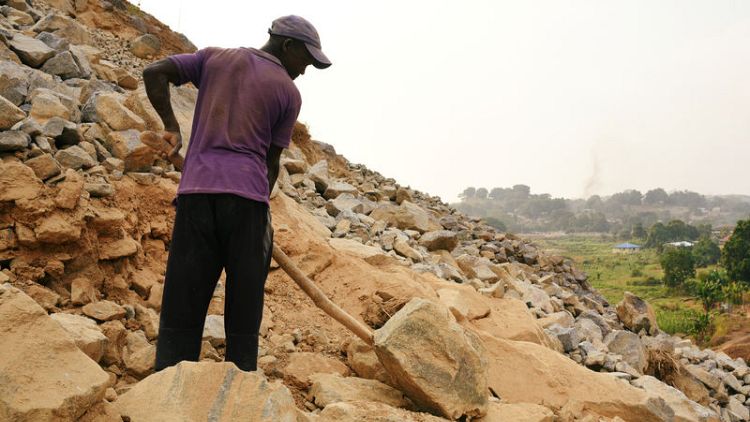By Cooper Inveen
FREETOWN (Reuters) - Sierra Leoneans living next to the country's largest diamond mine are taking their government to West Africa's regional court for failing to protect them from alleged environmental lapses by the company that runs it, a subsidiary of Octea Limited
The complaint, filed to the Economic Community of West African States (ECOWAS) court of justice on Thursday, alleges that the government failed to act when residents of Koidu, the largest city in the diamond-rich Kono district, complained about water contamination and damage to their houses from blasting at the mine.
It also said the government had failed to ensure that the company relocate hundreds of households away from the blasting site, as required by Octea's 2003 mining licence agreement.
"The State has violated (the plaintiffs') right to a suitable environment," it said.
The complaint follows a lawsuit filed by the residents against Octea in Sierra Leone's High Court in March seeking $288 million in damages for "degradation or destruction of land, destruction of homes and loss of livelihoods and ... dumping of toxic mine waste," among other allegations.
On July 22, a judge ruled that case was "adjourned for judicial recess" until the end of September.
Octea, a subsidiary of BSG Resources, founded by Israeli billionaire Beny Steinmetz, did not respond to emailed requests for comment on Thursday. It has described the accusations in the March case as "baseless and without merit."
The Sierra Leone government also rejects the complaints as unfounded.
"It's our job to conduct regular evaluations of [Octea's] conduct in regards to the environment, and we have never found them not to be compliant," said Ibrahim Turay, regional representative for the Environmental Protection Agency in Kono District.
He added that it was mainly residents who refused to go to the resettlement area who were continuing to have problems.
The cases highlight how communities in developing countries are becoming emboldened to use courts to pursue grievances against international mining firms.
In the new complaint, the residents demand the government address their concerns and pay compensation "for their emotional suffering resulting from their degraded quality of life and health, and the instability and uncertainty of their resettlement status."
The complaint also alleges that the Sierra Leone government failed to protect its citizens when security forces killed four people during protests against the mine in 2007 and 2012.
Seven plaintiffs say police opened fire on demonstrators and bystanders, killing two people at each protest, court documents show. Four of the plaintiffs say they were shot while fleeing the scene or while hiding from police.
A spokesman for Sierra Leone's security services did not immediately respond to requests for comment.
Following the 2007 and 2012 incidents, Octea subsidiary Koidu Limited made a goodwill payment to Sierra Leone's mines ministry to disburse to victims of the violence, the complaint filed on Thursday said.
Koidu Limited has not acknowledged making any payment.
Ibrahim Bokarie, a community activist and plaintiff who was shot in the foot during the 2007 protest, said he received 3,000,000 leones (255.34 pounds) towards his medical bills but that it was insufficient.
"Even with a new government in place, it's the same old story," he told Reuters. "That's why we're challenging the government in an international court. Enough is enough."
(Reporting By Cooper Inveen; Editing by Edward McAllister, Tim Cocks, Kirsten Donovan)
